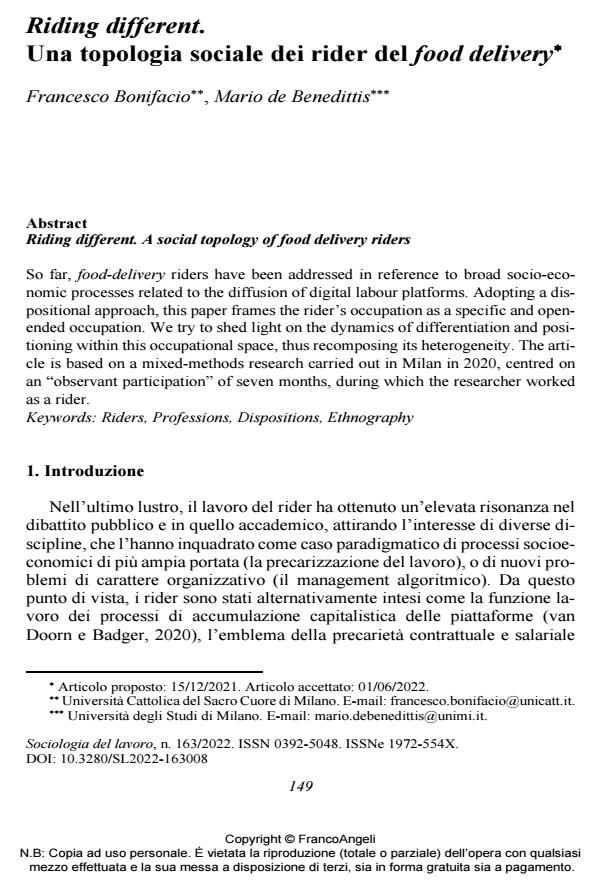Riding different. A social topology of food delivery riders
Journal title SOCIOLOGIA DEL LAVORO
Author/s Francesco Bonifacio, Mario de Benedittis
Publishing Year 2022 Issue 2022/163
Language Italian Pages 22 P. 149-170 File size 287 KB
DOI 10.3280/SL2022-163008
DOI is like a bar code for intellectual property: to have more infomation
click here
Below, you can see the article first page
If you want to buy this article in PDF format, you can do it, following the instructions to buy download credits

FrancoAngeli is member of Publishers International Linking Association, Inc (PILA), a not-for-profit association which run the CrossRef service enabling links to and from online scholarly content.
So far, food-delivery riders have been addressed in reference to broad socio-economic processes related to the diffusion of digital labour platforms. Adopting a dispositional approach, this paper frames the rider’s occupation as a specific and open-ended occupation. We try to shed light on the dynamics of differentiation and positioning within this occupational space, thus recomposing its heterogeneity. The article is based on a mixed-methods research carried out in Milan in 2020, centred on an "observant participation" of seven months, during which the re-searcher worked as a rider.
Finora, i rider del food-delivery sono stati studiati in riferimento a processi socioeconomici di ampia portata legati alla diffusione delle piattaforme digitali di lavoro. Adottando un approccio disposizionale, il presente articolo inquadra quella del rider come un’occupazione specifica e dalla struttura aperta, al fine di fare luce su alcune questioni rimaste in ombra. In primo luogo, le dinamiche di differenziazione e di posizionamento interne a questo spazio occupazionale. In secondo luogo, l’emergenza di una "doxa professionale", caratterizzata da saperi specifici e da una disposizione verso la condizione di relativa autonomia. In tal senso, il presente contributo intende ricomporre l’eterogeneità di questo mondo sociale, finora rappresentato come un’entità omogenea. L’articolo si basa una ricerca mixed-methods svolta a Milano nel 2020, incentrata su una "partecipazione osservante" di sette mesi, durante i quali uno dei due autori ha lavorato come rider.
Keywords: Riders, Professions, Dispositions, Ethnography
- La salute è un (video)gioco? La gamification delle app per health e fitness Marco Centorrino, Cristiana Ferrigno, in SOCIOLOGIA DELLA COMUNICAZIONE 66/2024 pp.131
DOI: 10.3280/SC2023-066008 - Algoritmi e piattaforme nel CrossFit competitivo: due studi di caso Mario de Benedittis, in SOCIOLOGIA DELLA COMUNICAZIONE 66/2024 pp.112
DOI: 10.3280/SC2023-066007
Francesco Bonifacio, Mario de Benedittis, Riding different. Una topologia sociale dei rider del food delivery in "SOCIOLOGIA DEL LAVORO " 163/2022, pp 149-170, DOI: 10.3280/SL2022-163008